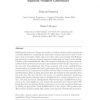Free Online Productivity Tools
i2Speak
i2Symbol
i2OCR
iTex2Img
iWeb2Print
iWeb2Shot
i2Type
iPdf2Split
iPdf2Merge
i2Bopomofo
i2Arabic
i2Style
i2Image
i2PDF
iLatex2Rtf
Sci2ools
126
click to vote
MCS
2010
Springer
2010
Springer
Resolution-stationary random number generators
Besides speed and period length, the quality of uniform random number generators is usually assessed by measuring the uniformity of their point sets, formed by taking vectors of successive output values over their entire period length. For F2-linear generators, the commonly adopted measures of uniformity are based on the equidistribution of the most significant bits of the output. In this paper, we point out weaknesses of these measures and introduce generalizations that also give importance to the low-order (less significant) bits. These measures look at the equidistribution obtained when we permute the bits of each output value in a certain way. In a parameter search for good generators, a quality criterion based on these new measures of equidistribution helps avoiding generators that fail statistical tests targeting their low-order bits. We also introduce the notion of resolution-stationary generators, whose point sets are invariant under a multiplication by certain powers of 2, ...
Related Content
| Added | 29 Jan 2011 |
| Updated | 29 Jan 2011 |
| Type | Journal |
| Year | 2010 |
| Where | MCS |
| Authors | François Panneton, Pierre L'Ecuyer |
Comments (0)

